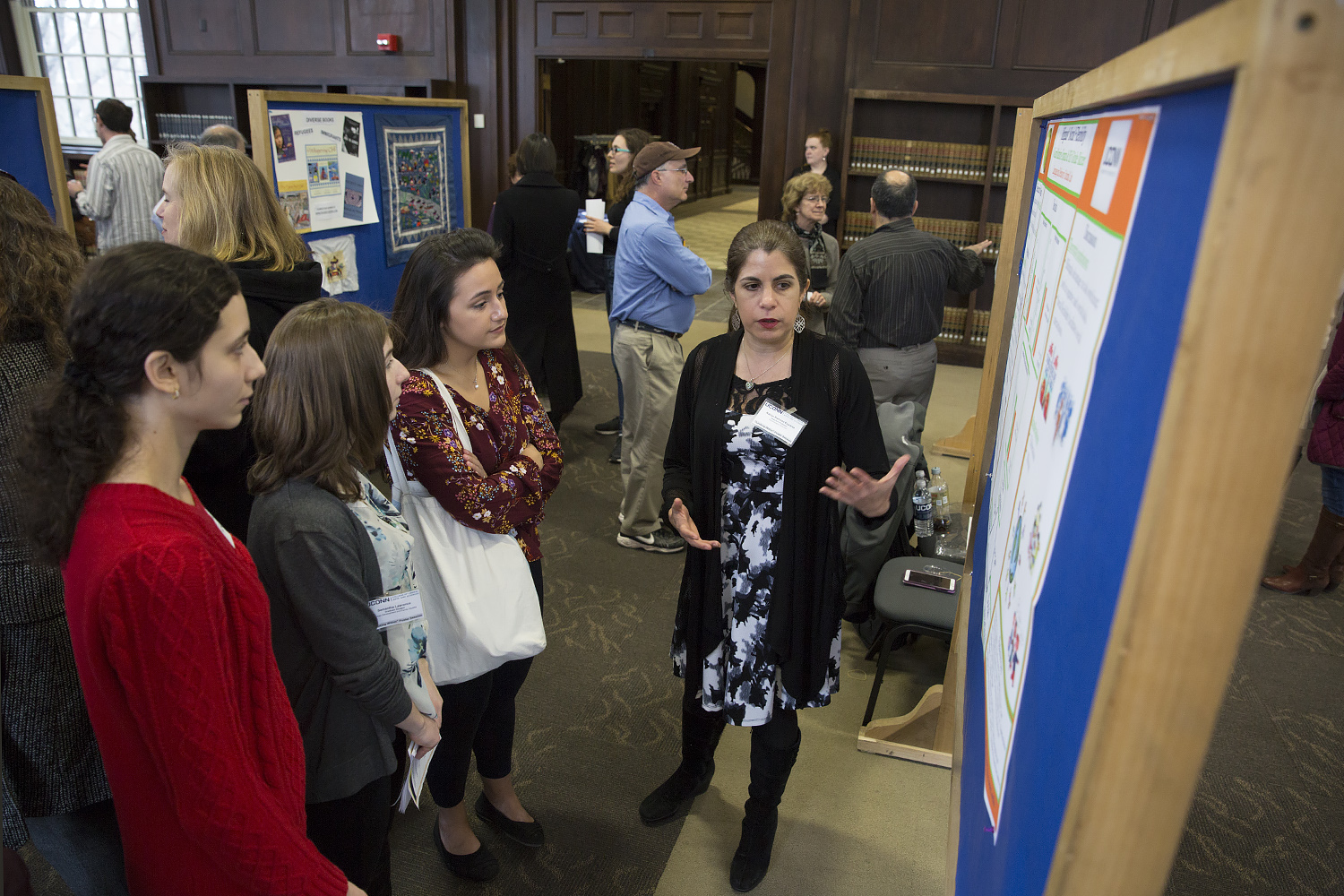Faculty, staff, and students from 14 departments and institutes across the College of Liberal Arts and Sciences and from the Storrs, Hartford, Stamford, and Waterbury campuses gathered on Friday for a research poster session devoted to themes of diversity.
Sponsored by the CLAS Faculty Council on Diversity, Equity, and Inclusion, “Looking Within: A CLAS Faculty Poster Session Featuring Research on Diversity and Inclusion-Related Matters” highlighted timely topics such as social flexibility in bilinguals, reducing social microaggressions, political movements born in black high schools, and how mindfulness can reduce prejudice.
But perhaps just as important, the themes were close to many hearts, according to CLAS Associate Dean of Social Sciences and Diversity, Equity, and Inclusion Cyrus “Ernie” Zirakzadeh.
“This is work that is personally important to so many of these researchers,” said Zirakzadeh. “I am truly inspired by my colleagues.”
Nairán Ramírez-Esparza, assistant professor of psychological sciences, presented on how being brought up bilingual affects social behavior. Although psychologists know that bilingualism has cognitive benefits, Ramirez-Esparza showed that bilinguals are also on the whole more comfortable switching from one social situation to another, and that they are more likely to seek social interactions.
“We know that interacting with others keeps you happy and healthy, so this is a good thing,” she said.
Ramirez-Esparza saw the event as an opportunity to increase exposure for topics that are not always appreciated.
“In some contexts, being bilingual is not valued, but bilingualism is something people should be proud of,” she said.
Micah Heumann, academic advisor in the Academic Center for Exploratory Students (ACES), presented his plan, with collaborator Eleanor Shoreman-Ouimet, assistant professor in residence of anthropology, to study the use and perception of microaggressions in the UConn student community.
The survey, Heumann said, will be a valuable educational tool for faculty, administrators, and students alike.
“We want to set the baseline for creating some real, positive change,” he said.
For Shayla Nunnally, associate professor of political science and Africana studies, the event was an opportunity to speak on a new research direction. She made the case that black public high schools, especially in Virginia, served to create social and political movements among black youth in the late 19th to late 20th centuries.
Having grown up in Virginia and attended the same school as her father, Nunnally is looking forward to field research and testimonials that will bring her back home.
“I am really excited to document these oral histories,” she said.
Alaina Brenick, assistant professor of human development and family studies at UConn Hartford, spoke on the effects of mindfulness on children in segregated schools in Tel Aviv. After practicing mindfulness exercises consistently, Palestinian and Israeli children each showed decreased prejudice toward the other group, an effect that was still in place 6 months later.
As a member of the CLAS Faculty Council on Diversity, Equity, and Inclusion, Brenick said the event was a way to create social networks between diversity researchers across departments and campuses, and to show the University community the strength and value of diversity research in CLAS.
“So many of us share common research and social justice goals,” she said. “The diversity of diversity is astounding.”
The session included contributors from the CLAS departments of anthropology, political science, ecology and evolutionary biology, economics, English, geography, statistics, history, human development and family studies, linguistics, psychological sciences, and speech, language, and hearing sciences; the Asian and Asian American Studies Institute and the Africana Studies Institute; and the Academic Center for Exploratory Students (ACES).



